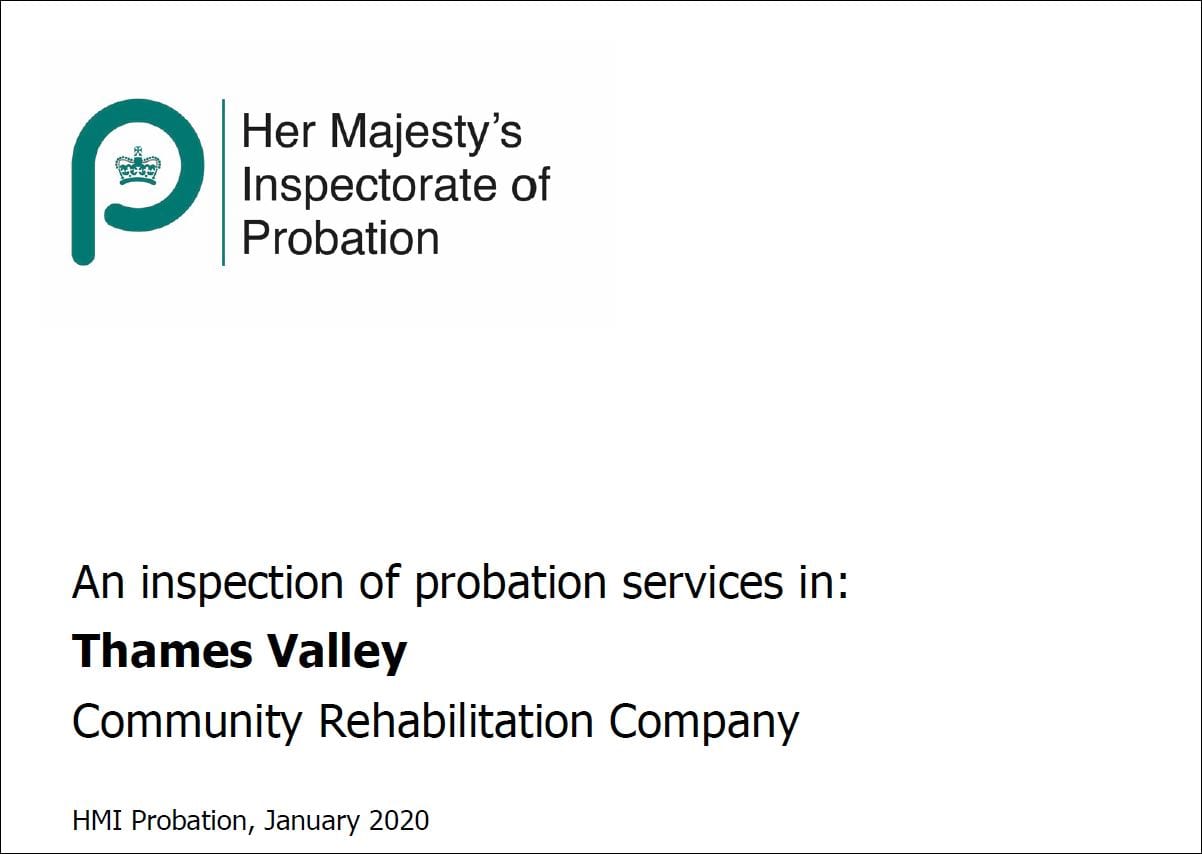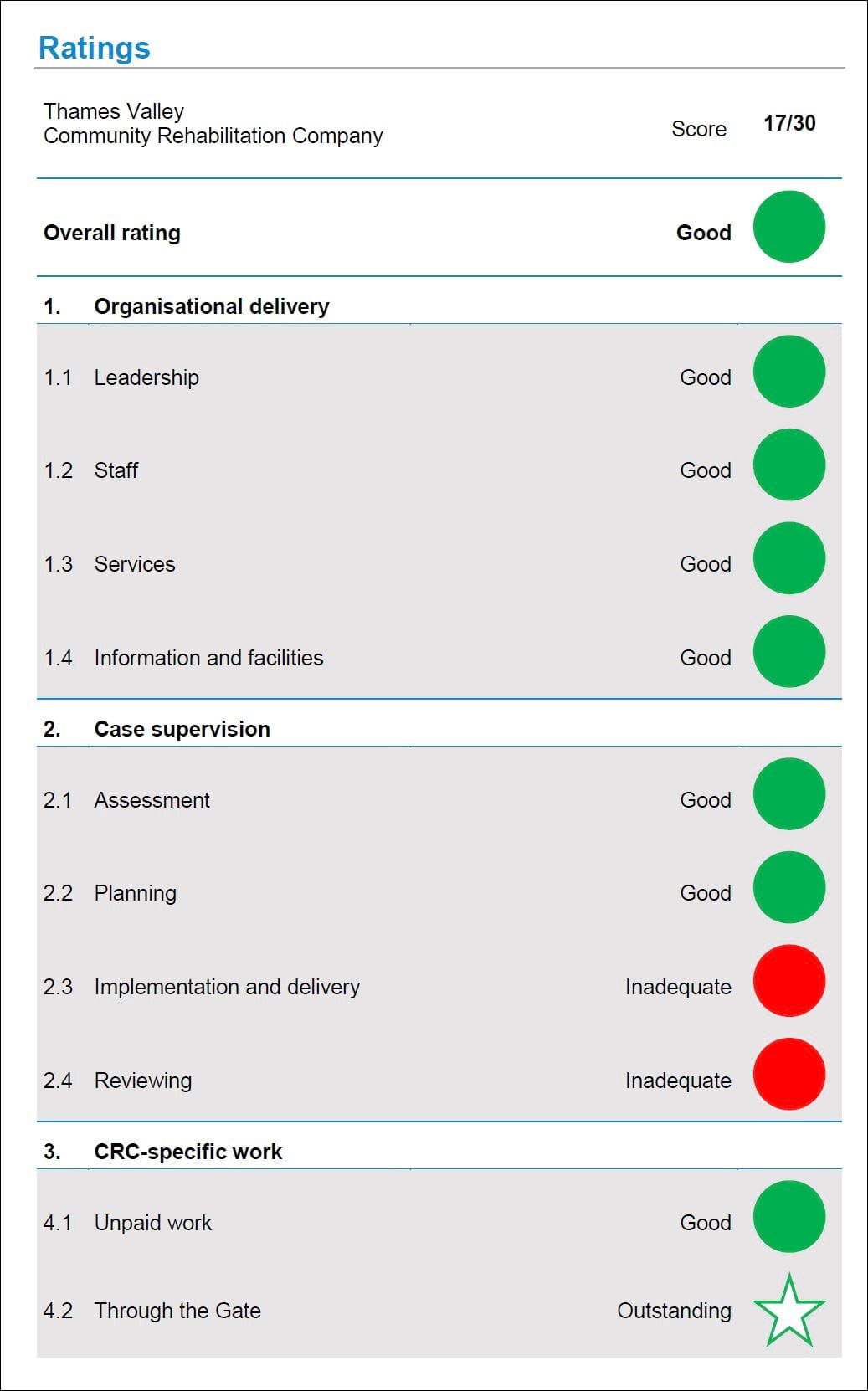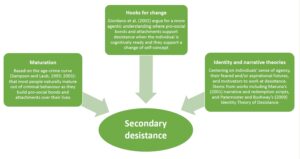Service upgraded to "good" from "requires improvement"
A probation service that operates across three of the home counties has been rated ‘Good’ by inspectors in a report published today.
HM Inspectorate of Probation conducted its annual inspection of Thames Valley Community Rehabilitation Company (CRC) in autumn 2019. Inspectors looked at 10 aspects of the CRC’s work and has given an overall ‘Good’ rating – its second-highest mark.
Chief Inspector of Probation Justin Russell said: “We previously inspected Thames Valley CRC in 2018 and found the service required improvement. We were concerned the CRC was not managing risks of harm effectively and there was a lack of services to help individuals move away from further offending.
“Managers and staff have acted on many of the recommendations from our previous inspection. The CRC is now much improved and performing well in most aspects of its work.”
The CRC is owned by MTC, an American family-owned organisation. The CRC supervises more than 4,200 medium and low-risk offenders from eight sites across Buckinghamshire, Berkshire and Oxfordshire.
Inspectors found robust processes are now in place so probation staff can access and share information more readily with the police and other agencies. This strengthens the CRC’s work to keep domestic abuse victims and children safe.
The CRC has improved its work to support people leaving prison significantly. The CRC’s Through the Gate service was previously rated as requiring improvement, but is now classed as ‘Outstanding’ – the Inspectorate’s highest mark. Inspectors found staff tailored plans and coordinated services to help individuals resettle in the community.
The CRC has also made major improvements to the way it supervises people who have been sentenced to complete unpaid work in the community. In 2018, inspectors raised concerns about the way the service managed people who could pose a risk to the public. The service has since introduced comprehensive staff training and new procedures to manage these individuals.
Although the service is more effective overall, inspectors found room for improvement in a few areas.
Mr Russell said: “We found staff put together good plans to help individuals rehabilitate, but these plans were not always delivered as intended.
“Since our last inspection, the CRC has increased the range of interventions and services to support individuals to move away from further offending. But it was disappointing to see this had not improved the quality of work to reduce reoffending, which was sufficient in just under half of the inspected cases.
“We also concluded that probation staff do not have sufficient contact with individuals to reduce reoffending.”
Under government proposals, the National Probation Service will supervise all offenders in the community from next year. All 21 CRCs across England and Wales – including Thames Valley – will close down.
Mr Russell said: “Despite the circumstances, Thames Valley have continued to invest in staff development and build good quality services.
“Senior leaders are dedicated to ensuring that when current contracts end, staff transferring to other organisations do so with their heads held high, well trained and confident in their work. This has paid dividends as staff throughout the CRC remain positive about their organisation and committed to their work.”
The Inspectorate has made six recommendations following the inspection, with the aim of improving Thames Valley CRC’s work yet further.
Key findings
Inspectors organised their key findings under three main headings: organisational delivery; case supervision and unpaid work & through-the-gate.
Organisational delivery
Inspectors’ main findings on this domain were positive. Key strengths of the organisation are as follows:
- Senior leaders are effective, and regularly exchange information with staff.
- Frontline staff feel aligned to the organisation’s vision and strategy, and believe that there is a focus on high-quality work.
- There is a strong adherence to ensuring that all work delivered is evidence based and can be evaluated.
- Staff have access to a comprehensive range of high-quality training opportunities.
The main areas for improvement are as follows:
- Some staff report being confused about aspects of the operational delivery model, which can lead to a lack of completion of meaningful work in some cases.
- The operating model should be more explicit in requiring recognition and consideration of individual personal circumstances and diversity characteristics in the planning and delivery of sentences.
Case supervision
Inspectors gave a mixed verdict about the core probation task of supervising offenders:
Key strengths of case supervision are as follows:
- Individuals are usually meaningfully involved in the assessment and planning of their sentences.
- Assessments, informed by a range of sources, effectively identify and analyse offending-related factors.
- Information is sought and shared, in relevant cases, in relation to domestic abuse and child safeguarding.
- Risk of harm classifications are accurate in the majority of cases.
Areas of case supervision requiring improvement include:
- There is not enough contact before release in licence cases.
- Despite the increase in available interventions, in too many cases insufficient services are delivered to address the factors linked to offending.
- Reviewing practice is stronger at considering strengths and protective factors but too often fails to engage the individual concerned, or make appropriate changes to plans in light of changes in risk of harm.
Unpaid work and through-the-gate
- Factors identified in assessment that can have an impact on an individual’s lives are catered for in planning to maximise compliance.
- Risks to the public and potential victims are identified and managed appropriately.
- Unpaid work staff communicate effectively with responsible officers.
Areas for improvement of unpaid work are:
- Opportunities are not always provided to increase employment-related skills.
- Individuals are sent away too often without the opportunity to complete their hours.
Key strengths of through-the-gate are:
- Plans are completed promptly, with meaningful engagement of the individual due for release, taking into account their strengths and protective factors.
- Risk of harm issues are recognised and managed appropriately in plans and activities.
- The resettlement services delivered attend to the most critical needs of the individual in most cases.
- There is good communication with responsible officers.
- Handover to community services on release is effective and supports resettlement.
Conclusion
The Probation Inspectorate works on a four-band rating system: excellent, good, requires improvement and poor. Previously, only one CRC was rated as “Good” and Thames Valley must be commended for making such significant improvements to performance even during a time when they know that the CRC will be wound up over the next year.
As you can see, this new assessment sees TV CRC shooting up my unofficial probation league table:









